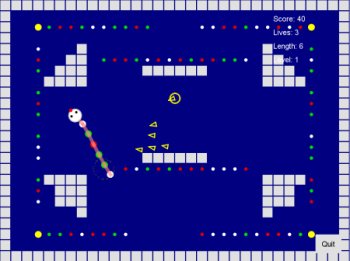I am once again a judge at the Webby Awards.
What were the best game-related websites of 2007? (Can be actual game sites or sites about games.)
Post your suggestions here.
My name is Jesper Juul, and I am a Ludologist [researcher of the design, meaning, culture, and politics of games]. This is my blog on game research and other important things.
I am once again a judge at the Webby Awards.
What were the best game-related websites of 2007? (Can be actual game sites or sites about games.)
Post your suggestions here.
Update: Thanks for your time and comments everybody. The test is now closed. I will post results when I have processed the data!
Can you spare 10 minutes to [game] science?
I am working on some experimental games, and I am looking for testers.
The test consists of you playing a game in your browser and answering some questions. The test is anonymous and takes around 10 minutes to complete.

Thanks for your time!
-Jesper
Jeff Minter is more that a little dissatisfied with the Space Giraffe sales on Xbox Live Arcade:
not seeing a lot of reason to continue even trying to make games, at this point, when a remake of Frogger, one of the worst games in the history of old arcade games, can outsell Space Giraffe that we put so much love and effort into, by more than ten to one, in one week.
OK, we get the message. All you want on that channel is remakes of old, shite arcade games and crap you vaguely remember playing on your Amiga.
We’ll shut up trying to do anything new then.
Sorry for even trying.
In case you don’t know Jeff Minter, he is a legendary game designer for people like me who grew up playing home computer games in Europe. Such as the original lawn mowing game Hover Bover!
Jonathan Blow has even compared Space Giraffe to Ulysses.
Now, the tricky issue is that Space Giraffe is a remake of an old arcade game called Tempest. Not shite, but still. Some of you may even vaguely recall playing it on your Jaguar or Nuon.
Perhaps that is beside the point – I am anxiously awaiting the Hover Bover, Gridrunner++, Revenge of the Mutant Camels or Sheep in Space remakes.

Just started Super Mario Galaxy, and it is great – it’s the Mario 64 formula, familiar and new, with no small amount of vertigo and wonderful animations.

The cruelty of November is all the big titles launching in time for the holiday sales. How can you divide your time between Super Mario Galaxy, Rock Band, Guitar Hero III, Assassin’s Creed, Mass Effect, Orange Box, Crysis, Phantom Hourglass, all the little fun indie games, Chain Factor, and those obscure Japanese DS games that you brought home?
Valve has posted their data on how Half-Life 2: Episode Two is played. (Data collection quite reminiscent of Microsoft’s work on Halo 3.)
Excerpt:
This is wonderful because, hey, we actually had no idea what those numbers would be.
The one number they don’t write is what percentage of players completed the game? If we for a moment boldly assume that the majority of players got the game around launch and will not get any further, the bottom graph indicates that the number is <45%. Which means that … the most common experience of playing HL2EP2 is that of not finishing it.
That is a bit of a guess, of course. We would need to see what the data looks like in 6 months to know a more final figure.
Also interesting, data on where people die on specific levels (marked in blue):
The Guardian has an interview with Will Wright in which he says:
The only next gen system I’ve seen is the Wii – the PS3 and the Xbox 360 feel like better versions of the last, but pretty much the same game with incremental improvement. But the Wii feels like a major jump – not that the graphics are more powerful, but that it hits a completely different demographic. In some sense I see the Wii as the most significant thing that’s happened, at least on the console side, in quite a while.
The interesting rhetorical move here is that “next-gen” has been tied to “more polygons” for such a long time, but why not reclaim “next-gen” for better purposes?
Just landed on my desk, a great new video game anthology edited by Barry Atkins and Tanya Krzywinska: Videogame, Player, Text.
My piece is Without a Goal: On Open and Expressive Games.

Edited by Barry Atkins & Tanya Krzywinska
Videogame, player, text examines both the playing and playful subject through a series of analytical essays focused on particular videogames and playing experiences. With essays from a range of internationally renowned game scholars, the major aim of this collection is to show how it is that videogames communicate their meanings and provide their pleasures. Each essay focuses on specific examples of gameplay dynamics to tease out the specificities of videogames as a new form of interaction between text and digital technology for the purposes of entertainment.That modes of engagement with the videogame text are many and varied, and construct the playing subject in different ways, provides the central theme of the collection. Online play, clan membership, competitive or co-operative play, player modification of game texts, and the solo play of a single player are each addressed through individual analyses of the gameplay experiences produced by, for example, The Sims, Grand Theft Auto, Prince of Persia, Doom, Quake, World of Warcraft, Street Fighter and Civilisation.
Contents
Introduction: Videogame, player, text – Barry Atkins and Tanya Krzywinska
1. Beyond Ludus: narrative, videogames and the split condition of digital textuality – Marie-Laure Ryan
2. All too urban: to live and die in SimCity – Matteo Bittanti
3. Play, modality and claims of realism in Full Spectrum Warrior – Geoff King
4. Why am I in Vietnam? – The history of a video game – Jon Dovey
5. ‘It’s Not Easy Being Green’: real-time game performance in Warcraft – Henry Lowood
6. Being a determined agent in (the) World of Warcraft: text/play/identity – Tanya Krzywinska
7. Female Quake players and the politics of identity – Helen W. Kennedy
8. Of eye candy and id: the terrors and pleasures of Doom 3 – Bob Rehak
9. Second Life: the game of virtual life – Alison McMahan
10. Playing to solve Savoir-Faire – Nick Montfort
11. Without a goal – on open and expressive games – Jesper Juul
12. Pleasure, spectacle and reward in Capcom’s Street Fighter series – David Surman
13. The trouble with Civilization – Diane Carr
14. Killing time: time past, time present and time future in Prince of Persia: The Sands of Time – Barry Atkins
It’s very unfair to Half-Life, but this 60 second sum up is more or less like I remember it.
It’s by Simon Krãtschmer and Jakob Rompkowski.
Why is it unfair? Half-Life is about mood and problem-solving, not so much about a great high-concept story.
[Via Dubious Quality.]